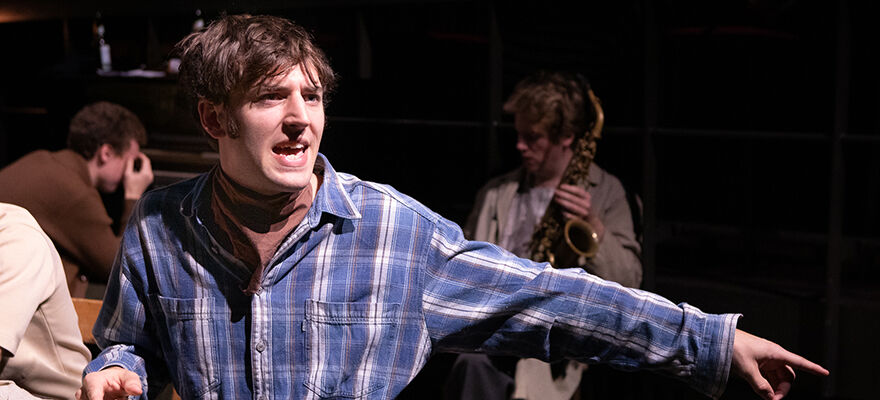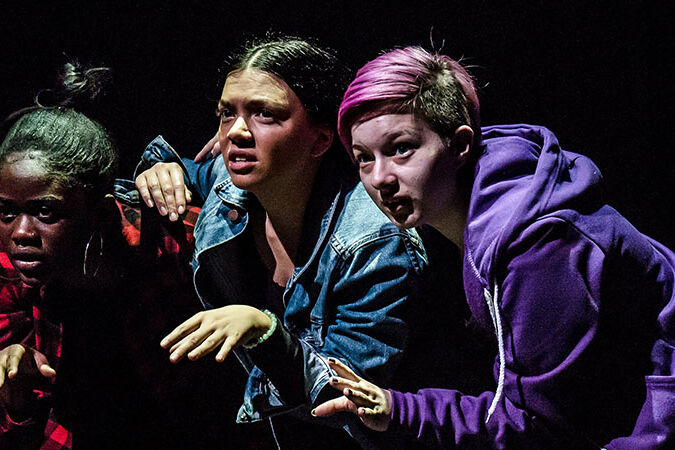
Blog

We caught up with Eleanor Homer and Henry Charnock in January 2020, both students in their third year of our BA (Hons) Acting course, who shared their tips and challenges after taking lead roles in RBC theatre company’s October run of productions.
Eleanor Homer, aged 21 from Dartford.
I have just finished playing the lead role of Jo March in the musical version of Louisa May Alcott's Little Women at the Crescent Theatre.
‘Big shoes to fill’
My number one priority was getting ‘off book’ during rehearsals (performing from memory rather than reading from a script). As the lead, I appeared in the majority of scenes, and if I didn’t know my lines this would slow down the process for other actors.
After reading the book, I immediately fell in love with the role. For me, Jo was my chance to play the ultimate heroine. This of course applied some extra pressure – playing a character that people already know and love – my main goal was to make sure I did the role justice.
Tops tips based on my experience
My main tip for anyone taking on a lead role is stamina! You can put in maximum effort one day but you need to make sure you have the energy to sustain yourself for the next day. There was definitely days where I felt completely burned out.
It is key to; pace yourself, eat well and get enough sleep.
Overcoming the challenges
Stepping into the spotlight as lead is definitely amazing. Those are the moments I had dreamed about since being a little girl. I did however feel a huge sense of responsibility; when you are the protagonist it's your job to drive the piece along and set the pace for the energy of the production. It is always very important to view the piece as an ensemble, because even as the lead you are still part of a team.
The biggest thing I have taken away from Little Women is a boost of confidence, which is something I have struggled with from a young age. There will always be challenges ahead, my new outlook is ‘Well if I could do that lead role, I can do this!’ If I am to encounter another huge role, I think I will be more prepared; sometimes being thrown into the deep end can be the best learning experience.
Henry Charnock, aged 29 from Surrey.
I recently played Leach in Jack Gelber’s The Connection. A grungy and iconic production focusing on heroin abuse and its link to jazz in the dark alleys of downtown 1950's New York. The play, a collaboration between Royal Birmingham Conservatoire's jazz musicians and Theatre Company, argues that human life is waiting for a “fix” (be it junk, money, love, etc.).

My character Leach is the addict whose home the action unfolds in. I adored playing this role. The two main things I personally love about acting are the opportunities to:
- Experience a broad range of emotions and behaviours that either might not be able to be expressed in my daily life – or that I might never have experienced/get to experience.
- Take someone and deeply empathise with their thought patterns and logic when, from the outside, they might seem illogical or even reprehensible.
Playing Leach provided both of these in spades. For example, my personal rhythm in day to day life is very laid back, but Leach is always on the front foot, quick-tempered and fiercely direct. Getting to explore those areas of myself through him was a gift – generally, the further away a character is from myself, the more interesting I find the part.
Key tips on preparing for a new role
- Examine what clues are in the text as to who the character is: What do they do? What do they say about others? What do others say about them?
- Break the play into each ‘moment’ the character experiences. This helps chart their journey through the play.
- You should then have a strong enough foundation to start answering the character’s ‘100 questions’ – an exercise I picked up from a previous director where you answer a set of questions ranging from things like “where did you grow up?” and “what are your parents like?” to “how do you dance?” or “have you ever considered suicide?” As you answer these questions, always keeping in mind the clues from the text, you start to build a really strong character biography and backstory from which to draw upon.
How to manage your nerves as a lead cast member?
In my opinion, playing the ‘lead’ is no different from any other role in a play. In any cast you are part of an ensemble and – whether the crux of the story revolves around your character or someone else – each member of that ensemble performs an essential role in telling that story. The only difference as a ‘lead’, is that you’re on stage more – which means doing the thing you love more, which is a blessing. If the play’s story could be told without one of its characters, they simply wouldn’t be in it.
My main piece of advice – plan ahead and manage your time, the more lines you have the longer it will take you to learn them. Try your best to learn them quickly (without crippling yourself!)
The majority of the things I have taken away from this production have been more to do with the way in which we worked in rehearsals: focusing on finding the joy to play; seeking to make bolder choices; finding something new every time; and focusing on the group’s complicité (togetherness/collective presence).




